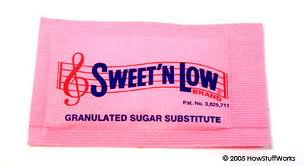 Using artificial sweeteners may set the stage for diabetes in some people by hampering the way their bodies handle sugar, suggests a preliminary study done mostly in mice.
Using artificial sweeteners may set the stage for diabetes in some people by hampering the way their bodies handle sugar, suggests a preliminary study done mostly in mice.
The authors said they are not recommending any changes in how people use artificial sweeteners based on their study, which included some human experiments. The researchers and outside experts said more study is needed, while industry groups called the research limited and said other evidence shows sweeteners are safe and useful for weight control.
The study from researchers in Israel was released Wednesday by the journal Nature.
The work suggests the sweeteners change the composition of normal, beneficial bacteria in the gut. That appears to hamper how well the body handles sugar in the diet, which in turn can result in higher blood sugar levels. This impairment, called glucose intolerance, can eventually lead to diabetes.
Some experts who didn’t participate in the work urged caution in interpreting the results.
James Hill, an obesity expert at the University of Colorado, called the work good science. Still, overall, “I do not think there is enough data yet to lead to a definitive conclusion about artificial sweeteners and the body’s handling of sugar,” he wrote in an email.
“I certainly do not think there is sufficient evidence to conclude that they are harmful.”
But Yanina Pepino of Washington University in St. Louis said the results make a convincing case that sweeteners hamper the body’s handling of sugar by altering gut bacteria. And it adds to her belief that sweeteners and sugar should be used in moderation, especially by children, she said. Read more in Washington Post.


Zero Calorie Sweeteners
Splenda
Splenda is ordinary sugar with added
Chlorine which is added to the sugar in a
laboratory to make the body reject it,
so that that the body has a hard time
storing it as fat.
The sweet taste is the sugar, the
strange aftertaste is the chlorine.
A packet of Splenda actually contains
¼ of the calories as sugar, but they can
legally write “0 calories” on the label
because it has very few calories.
Splenda can cause strong food
cravings for up to 72 hours later.
Consuming chemicals from a
laboratory is not always good for the
chemistry of our bodies, so it may slow
down the metabolism, which will
result in weight gain.
Other Zero Calorie Sweeteners
Zero calorie sweeteners are more
dietetic than sugar, but you are better
off with no sweeteners at all.
Like Splenda, the other sweeteners
may cause strong food cravings for up
to 72 hours, and like Splenda, it may
slow down the metabolism, which will
result in weight gain.
Stevia and xylitol are considered to be
safer than the others. Current research
indicates that they do not slow down
the metabolism. When scientists
conduct research on foods that exists
in the natural world, the research
tends to be quite reliable. However,
when scientists conduct research on
chemicals that are developed in a
laboratory, the research may not be as
reliable. Sometimes more time needs
to transpire to know something
definitively. Alternative sweeteners
are developed in a laboratory and
what is understood today about stevia
and xylitol may change.
Don’t think that sugar is more dietetic than fake sugar. It’s true that fake sugar is bad for your
health, may cause cravings, and slow down your metabolism, but real sugar is bad for your
health, causes cravings, slows down your metabolism, AND has calories!
So between the two, fake sugar is better than real sugar for weight loss.